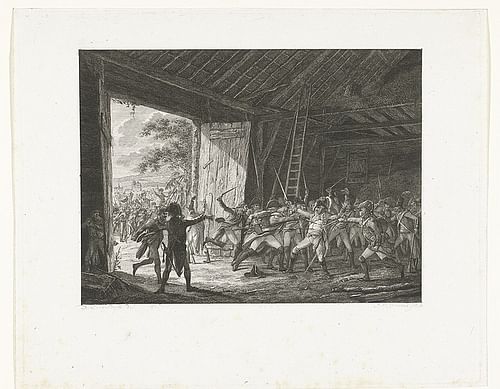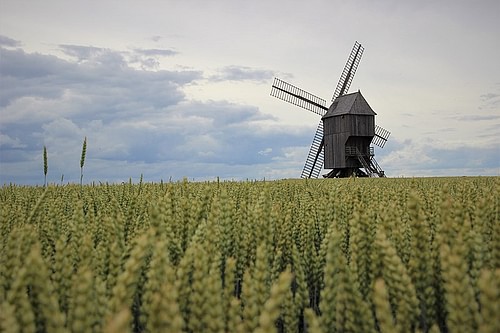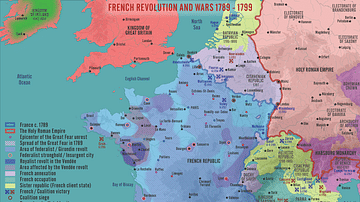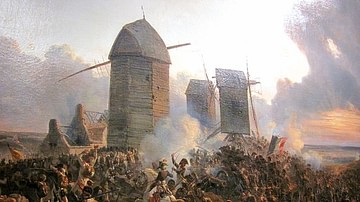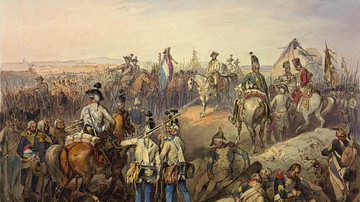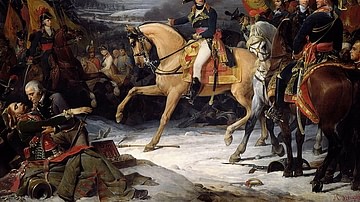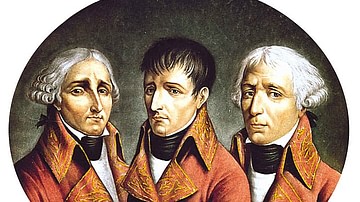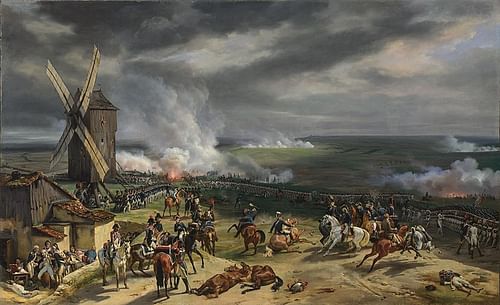
The Battle of Valmy was a stunning French victory over a Prussian-led coalition army on 20 September 1792, during the French Revolutionary Wars (1792-1802). Although the battle was little more than a skirmish, it halted the coalition's invasion, allowed for the establishment of the First French Republic, and ensured the continuation of the French Revolution (1789-99).
The battle itself was fought mainly as an artillery duel and is often referred to as the Cannonade of Valmy; over the course of a single day, over 20,000 cannon shots were fired. Although Valmy was a small affair, as far as major battles go, its significance cannot be overstated. The victory encouraged the French National Convention to abolish the monarchy and declare a republic the day after the battle. Moreover, it allowed for the rest of the events that would define the French Revolutionary and Napoleonic eras to occur, as well as all their accompanying ripple effects. For this reason, many historians consider it one of the most important battles of all time. As Charles de Gaulle himself wrote in 1932, "How can we understand Greece without Salamis, Rome without the legions…or our own Revolution without Valmy?" (Blanning, 79).
Crusaders & Tyrants
The War of the First Coalition (1792-97), the first of the French Revolutionary Wars, began on 20 April 1792, when the French Legislative Assembly declared war on "the king of Hungary and Bohemia," namely the young Habsburg monarch Francis II. The French declaration was motivated by a mixture of idealistic patriotism, paranoid fears of conspiracies, and desires to unmask the Revolution's enemies both at home and abroad. It was to be a quick, easy victory, at least according to the hawkish rhetoric of the Girondin political faction led by Jacques-Pierre Brissot (1754-1793). The Girondins believed that France's armies of liberated citizen-soldiers would effortlessly sweep aside the enslaved armies of despotic Europe. After all, according to Brissot, the war was about more than just defending France; it was about delivering the Enlightened principles of the French Revolution to oppressed peoples everywhere.
Preaching a 'universal crusade', Brissot convinced his countrymen that they would not be fighting for the future of France alone, but for the future of humanity. This may seem like fanatic idealism (which it may well have been), but it was also the culmination of everything the Revolution had been building up to thus far, a crossroads where it seemed the Revolution would either continue and expand or be snuffed out forever. To borrow an idea from French political scientist Alexis de Tocqueville, it is here where the French Revolution ceases to be merely a political revolution and takes on the characteristics of a religious one, transcending borders and nationalities. Though this was no traditional holy war, the revolutionaries indeed desired to spread a religion of sorts; their gods were Reason and Liberty, their prophets Voltaire and Rousseau. But there was one thing Brissot and his Girondin friends had not counted on, an aspect Maximilien Robespierre had soberly observed: no one loves armed missionaries.
As it turned out, the Girondins were wrong about a quick victory; the first months of war saw a string of French military disasters. Several French regiments left over from the royalist army defected to the Austrians, depriving France of much-needed professional soldiers. Then, in late April, an entire French force was routed after a skirmish with the Austrians. Retreating to the town of Lille, the French slaughtered their commanding officer, General Théobald Dillon, before mutilating his corpse. Dillon's murder, combined with the extreme and chaotic direction the Revolution was taking, caused the resignation of seasoned generals such as Comte de Rochambeau and Gilbert du Motier, Marquis de Lafayette, the latter of whom fled France altogether after a failed coup. To top it all off, Prussia joined the war on Austria's side in June and began marshaling an invasion force under the supreme command of Charles William Ferdinand, Duke of Brunswick.
Such catastrophic misfortunes incited hysteria in Paris. Counter-revolutionary enemies were seen hiding in every shadow, and the Parisians blamed the king and queen for treacherous disregard for the Revolution and the defense of the nation, leading to the violent Storming of the Tuileries Palace on 10 August, which saw a bloody battle rage between the king's Swiss Guards and Parisian rebels that left over 800 dead. This attack on the Tuileries marked the effective end of the French monarchy and sealed the fate of King Louis XVI of France (r. 1774-1793); yet it did nothing to reverse the tide of war, which was coming dangerously close to drowning the Revolution once and for all.
The Prussians Mobilize
The governments of Austria and Prussia were also certain the war would be a short one. The French economy was in shambles, its army was undersupplied and plagued by mass desertions, and its leaders were divided amongst themselves. With an air of deluded confidence mirroring that of the Girondins, the allies became convinced that the French people would welcome them as liberators against the anarchic revolutionary regime. "Do not buy too many horses, gentlemen," a Prussian officer told a group of Austrian soldiers, "this comedy will not last long. The army of lawyers will soon be crushed, and we shall be back home by autumn" (Blanning, 64).
Yet, like the French, the allies' own hubris would cost them, as they soon suffered setbacks of their own. The skirmish that had resulted in General Dillon's murder was followed by a three-month suspension of hostilities, during which time the allies had begun to amass their invasion force. The allies' plan, devised at a series of meetings in Potsdam, was for a main Prussian army of 42,000 men to march from Luxembourg and take the crucial French fortresses of Longwy and Verdun before securing the crossings of the river Meuse. There, they were to rendezvous with 56,000 Austrians under General Clerfayt who would have marched from Belgium, and the combined force would then descend on Paris. A second Austrian army of 50,000 would support them.
Problems arose from the start. As the invasion force began to assemble around the émigré stronghold of Koblenz, it became apparent that the Austrians were not prepared to uphold their end of the deal. A far cry from the nearly 100,000 men they promised, the Austrians ended up sending only 32,000. This discrepancy was due in no small part to the mutual distrust between the two German powers, but also because the Austrians were so confident of victory. Another issue was the awful bout of dysentery that struck the Prussian camp, afflicting up to two-thirds of their number. It got to the point where men were too weak to make it to the latrines, causing the camp to become littered with human waste and ailing men.
For these reasons, the Duke of Brunswick was hesitant to go forward. 57 years old and cautious by nature, Brunswick was content to wait until next year's campaign season; surely the French would have further weakened themselves by then. But the French émigrés accompanying the invaders dared not wait, lest further harm befall the royal family. On 25 July, the émigrés wrote a manifesto warning the French from doing just that, threatening to destroy Paris completely should the king and queen be injured. The Duke of Brunswick approved and issued this manifesto, which was afterwards called the Brunswick Manifesto after him.
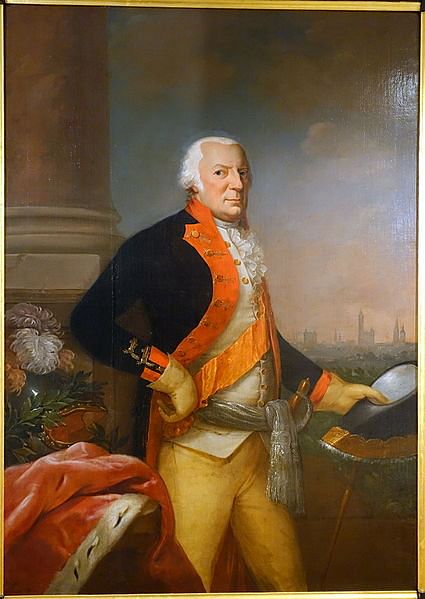
Yet, it massively backfired, becoming one of the major triggers for the attack on the Tuileries on 10 August. Panicked, the émigrés put more pressure on Brunswick to start the invasion, joined in their urgency by King Frederick William II of Prussia (r. 1786-1797). Frederick William, aware that he had yet to live up to his brilliant predecessor King Frederick II the Great, wished to build his own martial reputation and insisted on a swift victory before the year's end. With little choice, Brunswick led his 42,000 Prussians into France on 19 August, accompanied by the king himself.
At first, the Prussians' progress was indeed swift. After a quick siege, they took the fortress of Longwy on 23 August, laying siege to Verdun eight days later. Verdun, where the French would famously defy another German invasion more than a century later, this time offered only a meager defense and fell on 2 September, after a three-day siege. News of Verdun's fall caused a wave of panic in Paris, as nothing now stood between the invaders and the capital. In their hysteria, gangs of roving Parisians murdered between 1,100 and 1,400 prisoners in the September Massacres, fearful that they would have rebelled. These massacres only intensified the allies' sense of urgency, and Frederick William ordered Brunswick to push on to Paris.
The French Mobilize
With Paris sinking into anarchy, and somewhere between two-thirds and one-half of France's military officers having emigrated, things were not looking good. There was nothing left to do but to urge citizens to action; in a rousing, oft-quoted speech, minister of justice Georges Danton patriotically proclaimed:
The bells that will ring are not signals of alarm, but an order to charge against the enemies of the patrie [fatherland]. To defeat them, messieurs, we need boldness, again boldness, forever boldness, and France will be saved! (Bell, 130)
A little less inspiring was Danton's follow-up demand that those who did not cooperate be sentenced to death. But these were desperate times. The Legislative Assembly authorized large-scale recruitment from the sans-culottes, or patriotic lower classes, and sent battalions of the Parisian National Guard to the front. To fill the leadership void left by Rochambeau and Lafayette, the Assembly appointed Charles-François Dumouriez (1739-1823) to the command of the Army of the North. A career soldier, Dumouriez was a Girondin who had briefly served as foreign minister and had been a leading voice in the push for war. With orders to halt the Prussian advance and push the war back into Belgium, Dumouriez set out for his new command.
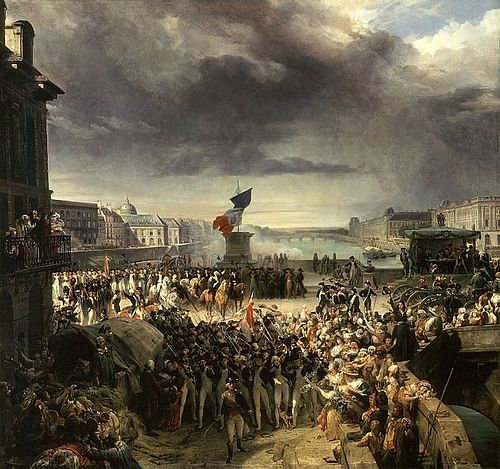
The state of his new army would not have been reassuring. Undersupplied, many French soldiers lacked guns and ammunition packs, with some dressed in little more than rags. Discipline was abysmal; the egalitarian culture fostered by the Revolution made new recruits less likely to respect the command structure. As the recent polarization of the Revolution discouraged moderates or royalists from volunteering for service, the rank and file largely consisted of revolutionary fanatics, many of whom followed the extremist dogma of the Jacobins. Naturally, this put them into conflict with those aristocratic officers who had not yet emigrated. Any officer who may have wished to discipline his men would have thought twice after what had happened to General Dillon. On the topic of discipline, General Biron of the Army of the Rhine wrote:
The volunteers of the most recent levy are more trouble than they are worth. All the generals to whom I wish to allocate them are afraid of them rather than keen to have them. (Blanning, 87)
This is what Dumouriez and his colleagues had to work with, but time was running out, so it would have to do. In the last days of August, Dumouriez led his 36,000-man army to the forest of Argonne, about ten miles (16 km) west of Verdun, where he intended to make his stand.
The Battle of Valmy
As Dumouriez was settling in the woodlands of Argonne, Brunswick was crossing the Meuse. By now, his numbers had dwindled to 34,000 thanks to dysentery that was still ravaging his ranks. Apprehensively, he approached Dumouriez's defensive position and, on 12 September, split his army, successfully outflanking the French. With Dumouriez's flanks exposed, all Brunswick had to do was pounce. Yet the Prussian general hesitated, allowing the French time to retreat. At the forceful insistence of Frederick William II, the Prussians then resumed their march to Paris.
Dumouriez, meanwhile, quickly withdrew to Sainte-Menehould, where he was reinforced with an additional 16,000 men from the Army of the Center, commanded by General François Christophe Kellermann (1735-1820). The French were now positioned behind the Prussian army, facing west. Brunswick could have ignored them and continued on to Paris, as nothing stood in his way. But this would have been a huge gamble; with so many of his men sick, he knew he had to keep open a path of retreat. It was necessary, then, to turn and defeat the French before pushing onward.
Brunswick swiveled his army around through the thick fog and steady drizzle. Around 6 am on 20 September, the Prussian vanguard led by Prince Hohenlohe came under fire from French artillery that they could not see through the mirk. It was coming from the heights of the small village of Valmy, where a French detachment under General Kellermann had taken up position beneath an old windmill. The Prussians brought up their own artillery pieces, struggling to set them up in the rain and muck. When the mists cleared, and they got a good look at their opponents, the Prussian soldiers became dismayed at what they saw.
Not only had the French occupied the high ground, but the troops looking down on the Prussians were not the ragtag, undersupplied men they had expected to find. Instead, Kellermann's soldiers were mostly well-equipped and well-armed regulars, as opposed to the volunteers that made up much of the rest of Dumouriez's force. Moreover, the artillery had been the one aspect of France's military not to be decimated by officer emigrations, meaning Kellermann's batteries were manned by professionals.
An artillery duel commenced, as the Prussians struggled to bring up the rest of their army. 54 Prussian cannons did their best to dislodge the French from their position, almost succeeding twice. The first time, Kellermann was almost killed by a Prussian cannonball when it struck the horse he was riding. The second time, Prussian shells hit a French ammunition cart, causing a great explosion. The terrified French troops were almost at the point of fleeing when Kellermann, standing up in the stirrups of his new horse, stuck his hat on the point of his sword and shouted, "Vive la Nation!" The cry was echoed by his men, who found their courage.
By 2 pm, most of the Prussian army had assembled, and Frederick William ordered an infantry assault. Slowed by the muddy terrain, the thin Prussian line moved uphill, under heavy fire from the French cannonade. As they got closer, the Prussians were able to hear the French singing their revolutionary songs Ça Ira and La Marseillaise. Before long, Brunswick realized it was fruitless to try and take the heights and called off the attack. By nightfall, the Prussians had suffered some 100 casualties, the French about 300. However, it was the French who held the field.
Aftermath
Under the cover of darkness, Kellermann withdrew his troops to Saint-Menehould, sabotaging the roads along the way in case the Prussians followed. They would not. At the edge of the battlefield, Brunswick had called a war council in a four-roomed inn, stating his reasons for wanting to withdraw before concluding they would not fight there. King Frederick William agreed. The time would come to defeat the French, but it would not be today.
While the high command talked cozily in their inn, the Prussian regular troops gathered around their campfires, trying to stay dry in the pouring rain. Sick, cold, and miserable, a group of soldiers turned to Johann Wolfgang von Goethe, the famed German writer who had accompanied the Prussian army out of curiosity. Goethe had entertained the soldiers with stories and poems before, and now they wanted to know what he thought of the day's events. By his own account, Goethe gave them a spine-chilling assertion: "From this place and this time forth commences a new era in world history and you can all say that you were present at its birth" (Schama, 640).
If Goethe truly did say this, then he could not have been more correct. Though at face value Valmy was little more than a skirmish, its ramifications were vast and far-reaching. The most direct consequence was the stopping of the allied invasion; Brunswick limped back across the Rhine, allowing Dumouriez to invade Belgium where he won a follow-up victory on 6 November at the Battle of Jemappes. The victory at Valmy, therefore, led to the continuation of war, ensuring that Europe would not see peace for 23 years.
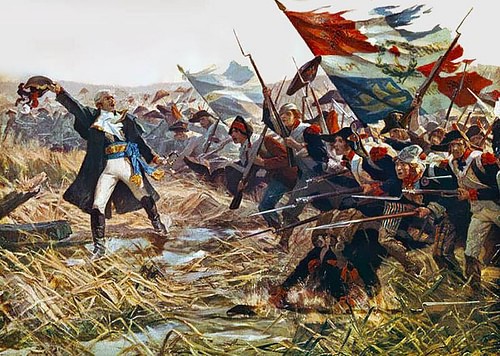
The battle also allowed the French Revolution to survive, emboldening the National Convention to officially abolish the monarchy and declare the First French Republic the very next day. In essence, the battle was the crossroads that allowed every significant event during the French Revolutionary and Napoleonic eras to take place, as well as the chains of events that they set off; had the French lost at Valmy, there very likely would have been no trial and execution of Louis XVI or Reign of Terror, no Napoleon I or Battle of Waterloo. While this is all speculation, of course, it just goes to prove Goethe right, showing how vital the Battle of Valmy was.
As for the victors of Valmy, Dumouriez would soon grow disillusioned with both the war and the Revolution itself. After his defeat at the Battle of Neerwinden, he defected to the Austrians in 1793. Kellermann, meanwhile, would not only remain loyal to the French but would be named a marshal of the empire by Napoleon Bonaparte and ennobled as the Duke of Valmy.
